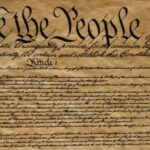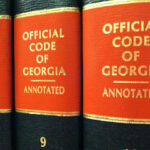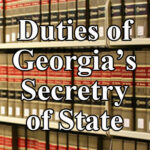Here are the documents that every Georgia citizen should know
The Constitution for the United States
 THE Conventions of a number of the States, having at
THE Conventions of a number of the States, having at
the time of their adopting the Constitution, expressed
a desire, in order to prevent misconstruction or abuse
of its powers, that further declaratory and restrictive
clauses should be added: And as extending the ground
of public confidence in the Government, will best
ensure the beneficent ends of its institution.
Click to download
The Constitution of the State of Georgia
 To perpetuate the principles of free government, insure justice to all, preserve peace,
To perpetuate the principles of free government, insure justice to all, preserve peace,
promote the interest and happiness of the citizen and of the family, and transmit to posterity
the enjoyment of liberty, we the people of Georgia, relying upon the protection and
guidance of Almighty God, do ordain and establish this Constitution.
Click here to download
The Official Code of Georgia

The enactment of this Code is intended as a recodification, revision, modernization, and reenactment of the general laws of the State of Georgia which are currently of force and is intended, where possible, to resolve conflicts which exist in the law and to repeal those laws which are obsolete as a result of the passage of time or other causes, which have been declared unconstitutional or invalid, or which have been superseded by the enactment of later laws. Except as otherwise specifically provided by particular provisions of this Code, the enactment of this Code by the General Assembly is not intended to alter the substantive law in existence on the effective date of this Code.
Click Here for Access
Rules and Regulations of the State of Georgia
Georgia Election Codes, Rules, and Regulations
Rules of the State Election Board
Official Code of Georgia Title 21 Elections
Duties of the Secretary of State

Click here to access the O.C.G.A. Title 45 Chapter 13
45-13-20. Duties of Secretary of State generally.
For Reference:
Registration with Secretary of State of trademarks or service marks, § 10-1-440 et seq.
Designation of Secretary of State as commissioner of securities, § 10-5-10.
Service by Secretary of State as ex officio corporation commissioner, § 14-5-20.
Authority of Secretary of State to challenge qualifications of candidates for federal and state office, § 21-2-5.
Powers and duties of Secretary of State relating to elections generally, § 21-2-50 et seq.
Powers and duties of Secretary of State regarding professional fund raisers and solicitors, T. 43, C. 17.
Citations of O.C.G.A. codes violated by Dominion and Election Supervisiors
O.C.G.A. § 21-2-300(a)(2). The statutory provisions mandate voting on “electronic ballot markers” that: (1) use “electronic technology to independently and privately mark a paper ballot at the direction of an elector, interpret ballot selections, communicate such interpretation for elector verification, and print an elector verifiable paper ballot;” and (2) “produce paper ballots which are marked with the elector’s choices in a format readable by the elector”
O.C.G.A. § 21-2-2(7.1); “Electronic ballot marker” means an electronic device that does not compute or retain votes; may integrate components such as a ballot scanner, printer, touch screen monitor, audio output, and a navigational keypad; and uses electronic technology to independently and privately mark a paper ballot at the direction of an elector, interpret ballot selections, communicate such interpretation for elector verification, and print an elector verifiable paper ballot.
O.C.G.A. 21-2-281 (2014) In any primary or election in which the use of voting equipment is impossible or impracticable, for the reasons set out in Code Section 21-2-334, the primary or election may be conducted by paper ballot in the manner provided in Code Section 21-2-334.
O.C.G.A. 21-2-344 (2019 version) as that statute makes the election superintendent THE FINAL AUTHORITY (notwithstanding any other statute and it still does) to determine whether to use the Dominion system or paper ballots
21-2-379.2 Review of manufacturer’s recording electronic voting system by Secretary of State; appointment and compensation of examiners; revocation of approval; penalties; conflicts of interest.
(a) Any person or organization owning, manufacturing, or selling, or being interested in the manufacture or sale of, any direct recording electronic voting system may request the Secretary of State to examine the system. Any ten or more electors of this state may, at any time, request the Secretary of State to reexamine any such system previously examined and approved by him or her. Before any such examination or reexamination, the person, persons, or organization requesting such examination or reexamination shall pay to the Secretary of State the reasonable expenses of such examination. The Secretary of State may, at any time, in his or her discretion, reexamine any such system.
(b) The Secretary of State shall thereupon examine or reexamine such direct recording electronic voting system and shall make and file in his or her office a report, attested by his or her signature and the seal of his or her office, stating whether, in his or her opinion, the kind of system so examined can be safely and accurately used by electors at primaries and elections as provided in this chapter. If this report states that the system can be so used, the system shall be deemed approved; and systems of its kind may be adopted for use at primaries and elections as provided in this chapter.
(c) No kind of direct recording electronic voting system not so approved shall be used at any primary or election and if, upon the reexamination of any such system previously approved, it shall appear that the system so reexamined can no longer be safely or accurately used by electors at primaries or elections as provided in this chapter because of any problem concerning its ability to accurately record or tabulate votes, the approval of the same shall immediately be revoked by the Secretary of State; and no such system shall thereafter be purchased for use or be used in this state.
O.C.G.A. 21-2-2(7.1) prohibited from having a “computing” function It is logically impossible for a BMD to take the elector’s input and translate that data into a graphic image in the nature of a “2D barcode” without a software routine or subroutine capable of making that computational translation into a printable graphic image which is placed on the face of a ballot.
Kemp v. Mitchell County Democrat Executive Committee, 216 Ga. 276, at 283 (1960) which states,
“It has long been the rule in this State that where there is no authority to hold the election, or where statutory requirements pertaining to the holding of an election are not complied with, the election is void, …”
That Honorable Court went on to say, citing precedent, that elections held in violation of mandatory statutes, in total disregard of the statutes, “…it can not be treated as an irregularity, but it must be held and adjudicated to be cause for declaring the election void and illegal.”
C.G.A. 21-2-366 (2010)
21-2-366. Authorization for utilization of optical scanning systems
The governing authority of any county or municipality may, at any regular meeting or at a special meeting called for the purpose, by a majority vote authorize and direct the use of optical scanning voting systems for recording and computing the vote at elections held in the county or municipality. If so authorized and directed, the governing authority shall purchase, lease, rent, or otherwise procure optical scanning voting systems conforming to the requirements of this part.
O.C.G.A. 21-2-334 (2010)
21-2-334. Voting by paper ballot when use of voting machine impossible or impracticable
If a method of nomination or election for any candidate or office, or of voting on any question is prescribed by law, in which the use of voting machines is not possible or practicable, or in case, at any primary or election, the number of candidates seeking nomination or nominated for any office renders the use of voting machines for such office at such primary or election impracticable, or if, for any other reason, at any primary or election the use of voting machines wholly or in part is not practicable, the superintendent may arrange to have the voting for such candidates or offices or for such questions conducted by paper ballots. In such cases, paper ballots shall be printed for such candidates, offices, or questions, and the primary or election shall be conducted by the poll officers, and the ballots shall be counted and return thereof made in the manner required by law for such nominations, offices, or questions, insofar as paper ballots are used.



